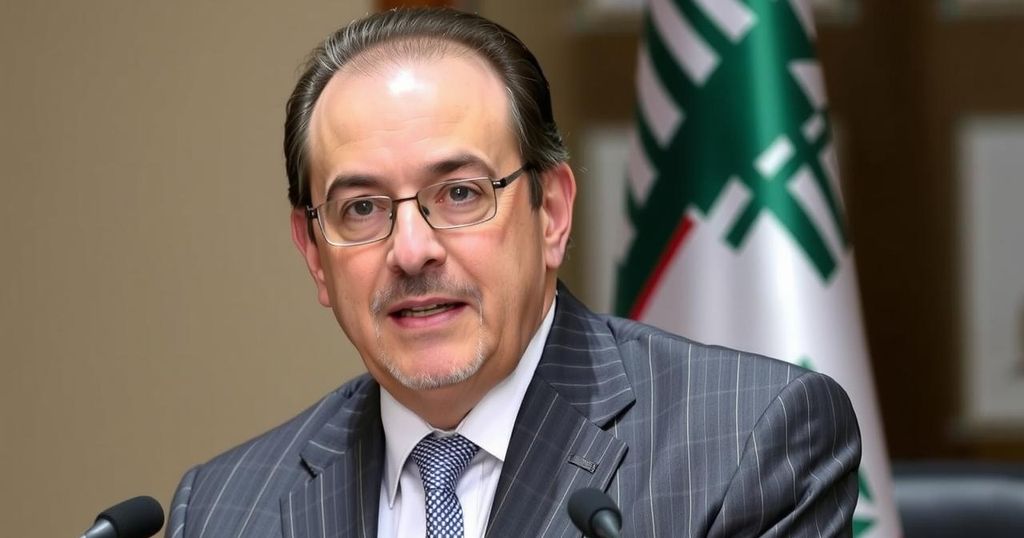Nawaf Salam Appointed Lebanon’s New Prime Minister Amid Political Shifts

Nawaf Salam has been appointed as Lebanon’s new prime minister amid significant political changes. His nomination, supported by a majority in the parliament, comes as Hezbollah’s influence wanes. Salam, an accomplished legal scholar and international diplomat, faces the challenge of forming a cabinet and implementing essential reforms amid Lebanon’s deepening crises.
Nawaf Salam, the esteemed president of the International Court of Justice (ICJ) located in The Hague, has been appointed as Lebanon’s new prime minister. Two-thirds of the 128-member Parliament nominated the 71-year-old, aligning with the sectarian power-sharing protocol that reserves this position for a Sunni Muslim. Salam’s candidacy surfaced during discussions with Lebanon’s newly elected President Joseph Aoun.
This announcement signifies a strategic setback for Hezbollah, a powerful political party and Iran-affiliated militia that had been advocating for the reinstatement of caretaker Prime Minister Najib Mikati, who received only nine parliamentary votes. Since Hezbollah’s recent military confrontations with Israel have considerably diminished its influence, senior party members like Mohammed Raad have expressed their discontent, accusing rivals of fostering division and exclusion. Raad noted, “Any government at odds with coexistence has no legitimacy whatsoever.”
Despite Hezbollah’s discontent, Salam garnered support from Christian and Sunni political factions, suggesting a potential for broader collaboration. Gebran Bassil, leader of Lebanon’s largest Maronite Christian bloc, referred to Salam as the “face of reform,” while Sunni lawmaker Faisal Karami emphasized the urgent need for “change and renewal” alongside the promise of international support.
Nawaf Salam hails from a prestigious Sunni family in Beirut, with historical ties to Lebanon’s independence efforts and previous leadership roles. Holding a doctorate in political science from Sciences Po in France, a doctorate in history from the Sorbonne, and a Master of Law degree from Harvard, Salam has had a distinguished career as a lawyer and educator. He served as Lebanon’s permanent representative at the UN from 2007 to 2017 before joining the ICJ.
As Salam assumes the role of prime minister, he faces the critical task of forming a cabinet capable of garnering a confidence vote in Lebanon’s fractious parliament. President Aoun’s electoral support, bolstered by significant international backing from the United States, France, and Saudi Arabia, has catalyzed his presidency, which promises crucial political and economic reforms. However, Aoun has also emphasized the need for the Lebanese state to regain exclusive control over arms, a direct reference to Hezbollah.
The challenges facing Lebanon are stern, including ongoing tensions from the Hezbollah-Israel conflict, an enduring economic depression, and the aftermath of the devastating Beirut port explosion. Securing a functional government under Salam’s leadership will be essential for addressing the multifaceted crises confronting the nation.
Salam’s appointment represents a decisive moment in Lebanese politics and reflects the complex interplay of sectarian interests and the demand for reform amidst deep national turmoil.
The appointment of a new prime minister in Lebanon is always a significant event, especially within the context of the country’s sectarian power-sharing system. This system, established to maintain a balance among various religious groups, stipulates specific governmental roles for representatives of different sects. The recent election of President Joseph Aoun, with substantial backing, has set the stage for crucial changes, particularly in the post-Hezbollah landscape, which has seen its influence wane after its military engagements. The pressing need for reforms, compounded by Lebanon’s economic crises and civil unrest, underscores the importance of Salam’s new leadership role.
In conclusion, Nawaf Salam’s appointment as Lebanon’s prime minister marks a pivotal shift in the country’s political landscape. His background and the support he has received from various political factions indicate a potential for significant reform. However, the task ahead remains daunting due to entrenched sectarian divisions and ongoing crises. Salam’s leadership will be scrutinized, as the nation anticipates effective responses to its manifold challenges in the coming months.
Original Source: www.bbc.com








